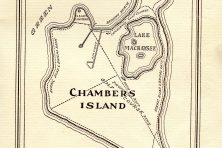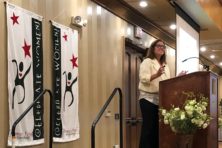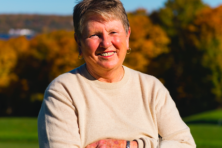Resurrection on the Links: After several uncertain years, golf is thriving again on the peninsula
- Share
- Tweet
- Pin
- Share

On Dec. 30, 2022, Green Bay Packers president Mark Murphy bought Maxwelton Braes golf course from Jim Bresnahan. Though many residents had feared the course would sell for development along the southern entrance to Baileys Harbor on Highway 57, Murphy made it clear that his intention is simply to maintain and improve the golf course.
That’s a welcome relief, considering that just eight years ago, Bresnahan bought the historical links from Baylake Bank after the Baileys Harbor course lingered for five years in foreclosure.
The turnaround in the fortunes of the game isn’t just seen at Maxwelton. Golf is thriving throughout Door County and drawing investors and lovers of the game to its courses.
When Randy Abrahams bought Alpine Golf Course in 2021, he focused on the golf experience first, renovating the clubhouse, and investing heavily in new equipment and employing a maintenance routine that has the greens rolling as well as or better than they have in 15 years. This after the course was closed in 2020 and the property up for sale.
Simon Ward, Alpine Resort’s director of golf operations, recalls that “the decline was incredible,” referring to rounds played during the Great Recession and course closures in the Midwest between 2008 and 2017. Likewise, Door County’s courses endured doldrums during recession and post recession years, but the course operators have been reinvigorating them.
New investments at Cherry Hills, Stone Hedge, Deer Run, Horseshoe Bay and Idlewild have furthered a boom on the links up and down the peninsula, getting a big boost from an unexpected source.
The COVID Bump
Golf’s comeback got an unlikely boost during the COVID-19 quarantines in 2020, taking course operators by surprise. Like a downhill putt, it has maintained its momentum.
PGA professional and first-time course owner Brandon Hansen acquired the keys to his Idlewild golf kingdom early in the spring of 2020. Just a few days later, the state temporarily banned public gatherings of all kinds – even golfing in the great outdoors.
But eventually, as Hansen’s course and others in Wisconsin and Door County reopened, they immediately saw great demand from experienced players – as well as first-time and former avid players – who were looking for something to do. Since then, he has seen more people playing golf at Idlewild each year, and more paid rounds have allowed him to breathe new life into the course through improvements that range from better drainage to new equipment.
Hansen said that so far this year, he has seen a 5% increase in play – on top of increases during the past four years. He said this season’s droughty conditions in late May and the entire month of June meant that he and other Door County course operators had no closings because of high water levels or all-day rains that keep players away. Although that meant extra work, more wear and tear, and higher electric bills for irrigation, he’s feeling encouraged.
“Rounds are up. Equipment sales are up. Golf is just up,” Hansen said, noting that what he sees at his course coincides with reports he receives from the PGA.
At Peninsula State Park Golf Course, pro and general manager Jason Daubner said he has a busy driving range, full leagues and a packed tee-time sheet most days. He said it helps to have “good weather, a good economy and a good golf course.”
National Golf Foundation (NGF) statistics showed rounds played in Wisconsin increased by 11.2% in May 2023 compared to May 2022. For Illinois – a state that sends Door County many of its summer visitors – the NGF reported a 27.2% increase in rounds played in May 2023 over 2022. And while course operators braced for the worst in 2020, rounds played nationwide increased by 13.9% from 2019 to 2020 – even with limits on the number of golfers on courses and one-rider-per-cart restrictions that were established in many places in 2020.

“The only thing you were allowed to do was golf,” Ward said, noting that some “people who had no intentions of ever playing golf” gave the game a try.
But more factors than just the pandemic restrictions play into golf’s resurrection. The timing of the COVID-19-year boom coincided with efforts by the USGA and PGA to promote faster play, encourage more quick morning or after-work nine-hole outings, and advocate more user-friendly moves such as simpler rules on relief and drop zones after a lost ball or a shot into the woods, and allowing people to leave the pin in while putting, Ward said.
Rounds played by beginning golfers age 6 and older rocketed to 2.4 million people during the Tiger Woods–inspired boom of 2000. Then, after a decline in newcomers during the Great Recession, the number of new players increased to 3.2 million in 2020 and 2021, according to NGF figures.
Hansen said he sees a lot of players who have become avid golfers during the past two years, after giving up the sport several years ago.
New Stone Hedge Golf Course owner Kevin Wehrenberg said he’s observing the same trend, plus many newcomers to the game who feel comfortable with the informal nature of his nine-hole course and clubhouse east of Egg Harbor.
At The Orchards at Egg Harbor, owner John Jackson said business is great, leagues are full, and there’s an increase in players in the 20- to 30-year-old age group who are willing to pay a premium on green fees to play a difficult and well-manicured championship course. Although he’s not sure full-time Door County residents are playing more or less golf, he observes that there are certainly plenty of visitors who have the time, desire and disposable income to play a lot of golf.

At the private Horseshoe Bay Golf Club, longtime superintendent Brian Ferrie said he doesn’t have statistics, but the course is in tremendous demand. Horseshoe Bay has waiting lists for memberships, and this year it completed major improvements and expansion of the members’ clubhouse.
“I also play in a league at Peninsula State Park,” Ferrie said. “Jason Daubner’s a good friend of mine there – and Mike Becker, the superintendent, is my former assistant – and I would guess they would tell you the same thing: Everybody’s probably playing near capacity, weather permitting.”
Wehrenberg bought the nine-hole Stone Hedge in 2021 and has reinvested heavily in clubhouse expansion and grounds improvements while also working toward more player-friendly conditions.
Cherry Hills was on the brink of closing in 2015 when Jon Martell bought the 18-hole course north of Sturgeon Bay and breathed new life into the entire facility – greens, fairways and buildings. The golf revival since 2020 has come as a relief for Martell, who’s glad that many people have become hooked on the game.
“The golf bug is real,” he said. “The spike in golf in 2020 was substantial, and it definitely got a lot of casual golfers more involved and brought new golfers to the game.”
Although a good economy and dry weather lead to more play, Ferrie still looks back to 2020 as a driving factor in the game’s resurgence.






